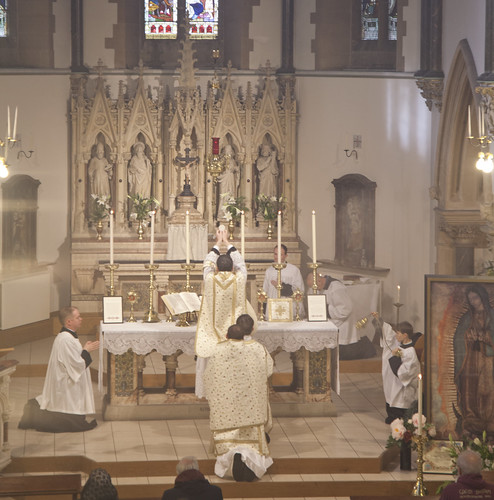 |
| LMS Pilgrimage to Our Lady of Guadalupe, in the Church of St Joseph, Bedford |
I have a piece in LifeSiteNews on this widely-reported survey, which says exactly what one would expect: Catholics attached to the Traditional Mass overwhelmingly believe the teachings of the Church and fulfill their obligations to attend Mass and go to confession.
I think the survey is a good effort, but I'd like to put its contrast with data from other surveys on the beliefs and practices of Catholics as a whole into some context, beyond what I wrote for LifeSite.
Conservative Catholics reading the period results of mainstream Catholic opinion and
practice may get the feeling that the findings exceed their most pessimistic estimate of their
co-religionists. Amazingly few Catholics appear to know, let alone confess, the teaching of the Church on the Real Presence; scarcely any actually follow the Church’s teaching on contraception.
One reason for this is poor methodology in the surveys themselves. Notoriously, one survey
which claimed that almost no Catholics accepted the Church’s ban on contraception arrived at this conclusion by excluding from consideration various categories of women; with other flaws, this made the survey pretty worthless.
Even the respected research institute attached to Georgetown University, CARA, tends to survey ‘self-identified’ Catholics instead of Church-going Catholics. But what does it mean to ‘identify’ as a Catholic while rejecting all her teachings and never going to Church? The results of surveys including this category will reflect how many such people there are; how many there are in turn depends not only on the rate of lapsation and poor formation, but in the strength of the idea that one can be a ‘Catholic’ in some tribal sense completely unconnected with belief and practice.
Interestingly, in Britain a recent academic study showed that Anglicans are very happy to keep calling themselves Anglicans when they have lapsed, while Baptists stop calling themselves Baptists if they aren’t fully committed. The attitude of Catholics falls between these extremes. A less complete study would have suggested that Baptists are far more committed than Anglicans, but also more likely to lapse, which would have been misleading: in effect it compared committed Baptists and uncommitted Anglicans.
What this survey of church-going Catholics, attached to the ancient Latin liturgy, shows is that, within the undifferentiated mass of ‘Catholics’ who have a confusingly wide range of views and religious practices, there is at least one sub-group which is genuinely faithful to the Church, her teachings and requirements, and who average a reasonable number of children to whom this Faith can be passed on.
I think the survey is a good effort, but I'd like to put its contrast with data from other surveys on the beliefs and practices of Catholics as a whole into some context, beyond what I wrote for LifeSite.
Conservative Catholics reading the period results of mainstream Catholic opinion and
practice may get the feeling that the findings exceed their most pessimistic estimate of their
co-religionists. Amazingly few Catholics appear to know, let alone confess, the teaching of the Church on the Real Presence; scarcely any actually follow the Church’s teaching on contraception.
One reason for this is poor methodology in the surveys themselves. Notoriously, one survey
which claimed that almost no Catholics accepted the Church’s ban on contraception arrived at this conclusion by excluding from consideration various categories of women; with other flaws, this made the survey pretty worthless.
Even the respected research institute attached to Georgetown University, CARA, tends to survey ‘self-identified’ Catholics instead of Church-going Catholics. But what does it mean to ‘identify’ as a Catholic while rejecting all her teachings and never going to Church? The results of surveys including this category will reflect how many such people there are; how many there are in turn depends not only on the rate of lapsation and poor formation, but in the strength of the idea that one can be a ‘Catholic’ in some tribal sense completely unconnected with belief and practice.
Interestingly, in Britain a recent academic study showed that Anglicans are very happy to keep calling themselves Anglicans when they have lapsed, while Baptists stop calling themselves Baptists if they aren’t fully committed. The attitude of Catholics falls between these extremes. A less complete study would have suggested that Baptists are far more committed than Anglicans, but also more likely to lapse, which would have been misleading: in effect it compared committed Baptists and uncommitted Anglicans.
What this survey of church-going Catholics, attached to the ancient Latin liturgy, shows is that, within the undifferentiated mass of ‘Catholics’ who have a confusingly wide range of views and religious practices, there is at least one sub-group which is genuinely faithful to the Church, her teachings and requirements, and who average a reasonable number of children to whom this Faith can be passed on.
I hope the poor study is expanded. I would like to see information about
those answering the questions - age, sex, marital status, and whether they are
converts or cradle Catholics. And I would like to see a comparison with
Catholics attending the Ordinary Form, as opposed to people saying they are
Catholics and not attending anything. Another interesting comparison might be
Catholics who are members of the ‘New Movements’ (Neo-Catechumenate, Focolare,
Communion and Liberation, and so on).
In the meantime, we should be grateful that serious statistical study of Latin Mass-going Catholics has finally begun.
In the meantime, we should be grateful that serious statistical study of Latin Mass-going Catholics has finally begun.
Support the Latin Mass Society
No comments:
Post a Comment